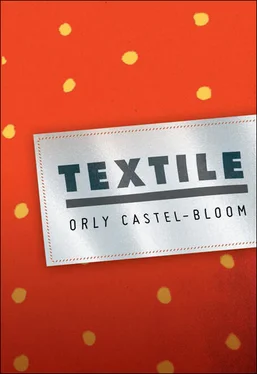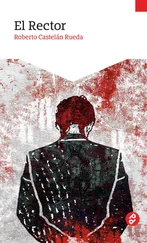The sign that she was doing the right thing she found in the terrible headaches which assailed her before she had decided between the two. As long as they continued, alternating between the left side of her head and then the right, she felt torn between her loyalty to the United States and her loyalty to herself. But the moment she made up her mind, they vanished into thin air.
“I don’t feel like coffee,” she suddenly said sadly, and it seemed that only then she noticed the presence of the parrot that was now perched on the windowsill. But she ignored it.
“Do you want me to make you chai?” asked Propheta happily.
“Yes, but I haven’t got any cardamom.”
“I know you haven’t. I took note of it,” he smiled at her and she smiled back at him, a perfunctory smile, not from the heart but out of embarrassment.
McPhee approached the sofa where Gruber was sitting.
“After the chai we’ll go to visit my spider farm,” she said. “And in the meantime the pills will take effect.”
“What pills do you take?” asked Gruber with affected empathy.
“None of your business,” she said, and he was horrified by her bluntness.
Suddenly breaking news came on the television. A mass terror attack in Geneva. The first pictures. Exclusive.
All three turned their eyes to the screen, two of them as if what was now being shown on the television was an earthquake of seven points on the Richter scale in the third world. There were things that had to be done.
“Is anywhere safe from them?” murmured Gruber in the voice of decent humanity.
Propheta said, “It would be better if I didn’t say what I think.”
“Much better,” said Bahat carelessly.
Propheta was insulted again, but what could he do. This was the path he had chosen.
“I have to phone home. I haven’t spoken to my family since I arrived,” said Gruber urgently, as if the attack had taken place in Israel and his family was in danger.
“It must be night in Israel,” said Propheta without a second thought.
“Ahh,” said Gruber, “my wife must be sleeping. She goes to bed at nine o’clock. My son, if he isn’t sleeping, is taking part in some targeted intervention. And my daughter is singing lullabies to her boyfriend’s organic vegetables in the Negev. I’ll call them in a few hours’ time. So they won’t be worried about me.”
IN THE MORNING, AFTER EVERYONE HAD GONE TO WORK, Lirit sat in the shopping center Mikado in Café au Lait, where they only served coffee without milk in special circumstances, and she waited for ages for the latte in a mug she had ordered. Lirit really wanted to complain to the owner, but what good would it do her. She surveyed the scene. In a shallow pool eight disciplined openings gave rise to a meter-and-a-half high jet, which fell dead straight onto itself, God forbid a drop should stray from the regime imposed on it by the designer. They told the designer without a lot of splashing, and he did as he was told. To the left was a pizza parlor called Big Apple Pizza. The shopping center was quite empty, because the children who usually hung out there were in school. At last they had opened a school here in the neighborhood. The mothers had been going crazy from driving their kids to distant schools every morning.
The latte in a mug arrived and Lirit told the waitress that she had been waiting for more than ten minutes. The waitress replied that that was how long you waited here for latte in a mug.
Lirit didn’t like coffee. But a day and a bit after her mother’s death, this was the least she could do in her memory: drink a latte in a mug. She didn’t yet feel pain at the loss. She was indifferent, as if nothing had happened. Perhaps it was the shock, she thought to herself.
Earlier that morning she had quarreled with Dael, who wanted to return to his base. He said that in any case there was no funeral because their mother had donated her body to science, and no shivah either, and in any case they had lost track of their father in the USA, and they didn’t want to see anybody anyway — so what the point in him staying?
In the end Lirit thought that he was right, and he went back to the field. But yesterday he had managed to take care of placing death notices in the street and in the three newspapers. On the way to the café Lirit passed one of the notices and read it. Lirit thought generally that perhaps she would study graphic design. She had never actually read a death notice before. And one about her mother too.
She looked round and came across more death notices about her mother, as well as one about somebody else whose family had gone for a normal funeral in Kiryat Shaul. What was all this bereavement suddenly? She was angry because it seemed so irrelevant to her family. They whole place suddenly seemed to her like some habitation of ghosts. She had hardly made it to Café au Lait.
It jarred her to see her mother’s name plastered all over Alexander Penn Street, but that was the reality, she reminded herself again. Twice she stopped to read the notices that Dael had composed for the street. The other one he published in the newspapers. While she drank her coffee she went over both of them in her mind:
Our beloved
Amanda (Mandy) Gruber née Greenholtz
Has suddenly left us
And donated her body to science.
Please refrain from condolence calls.
Her dear ones.
And the notice in the newspapers said:
The textile factory Nighty-Night
Bows its head
At the untimely death of its manager
Amanda (Mandy) Gruber of blessed memory,
A warm, diligent, and benevolent woman,
And offers its condolences to the family.
After she finished her coffee she had no idea what to do with herself. She was simply completely paralyzed, but it was clear to her, and this actually helped her, that she wasn’t going to any factory today. At maximum, she would answer the phone in the event that people from the factory, or her father’s jet set, wanted to offer their condolences. But people would want to know how, when, why she died, and Lirit didn’t have the motivation to tell the whole story of her deterioration over and over again. She decided that never mind the gossip and the rumors, she was going to disconnect all the telephones.
But what if her father called? How could she disconnect the phones? But screen the calls, yes. Local calls she could screen, but if there was an unidentified caller, and it turned out not to be her father, she would just say it was the wrong number.
She went back to staring at the fountain with the jet falling onto itself, and she remembered how her mother used to say that it wouldn’t do anybody in the Levant any good, however much they played at being in Europe or Los Angeles, they didn’t have the first idea about aesthetics. “It’s only now that they’re beginning to get it into their heads, Liritush,” she said to her once, “but they’re already in the swing of building a state and they can’t change their style.”
She couldn’t remember if her mother had made any criticisms of Tel Baruch North as well. Lirit actually thought that the fact that there wasn’t a drop of Zionism in the place made it international, and the fact that there wasn’t any socialism made it progressive. True, she didn’t say this out loud, because of Shlomi, who after his one-time visit said that it was enough to look at the people’s faces and see how they behaved to conclude that they were hedonistic Israelis in a new suburb of North Tel Aviv, interested in nothing but themselves.
And indeed, after sitting there staring for an hour she could see so for herself: women a little bit older than she was, and also of thirty and forty plus, all of them with Ray-Ban glasses, smartly dressed from top to toe, going from shop to shop, and parallel to them, grannies with pigmentation problems running after grand-children, one or two of whom were escaping in the direction of the escalators and standing there wailing at the top of their voices, and in the end the grannies gave in and rode up and down the moving stairs again and again and again. Where was she going to get the patience for all this?
Читать дальше












